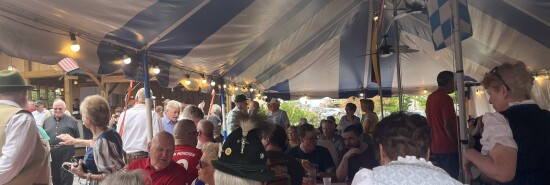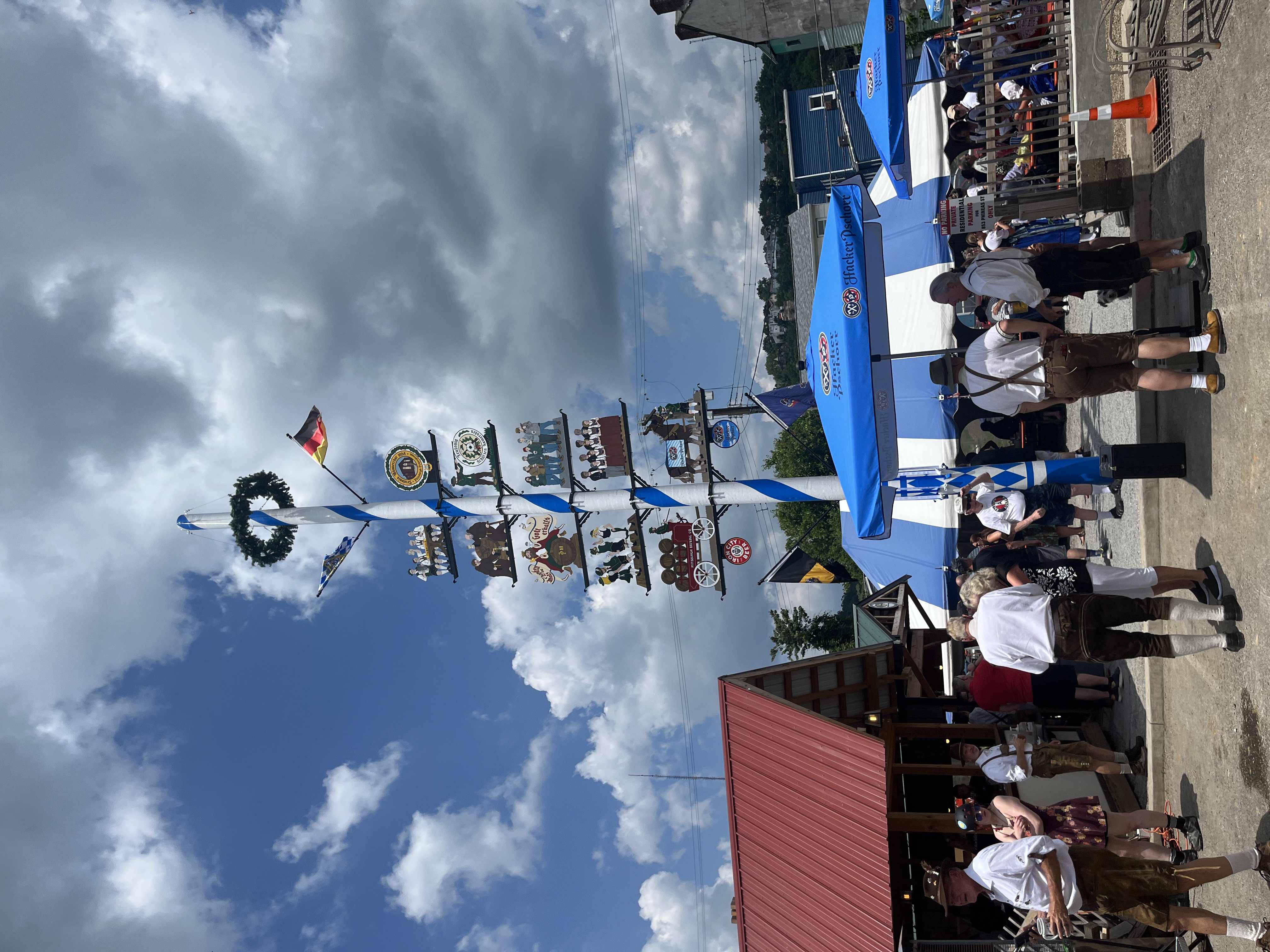
A maypole in Pittsburgh is a sign of community
Salena Zito
Video Embed
PITTSBURGH, Pennsylvania — Call it a wicked sense of humor, or an act of exasperation after spending nearly a decade in bureaucracy hell trying to get a permit. If you look close enough at the base of the newly erected Maibaum (maypole) towering over the beer garden here at the Teutonia Mannerchor club, there is a 3-inch etching of a house with the number 849 over its tiny front door.
Seems odd, right? Well, not if you had to spend all of this time getting the permit, and the only way the city bureaucrats would sign off on it was if the pole met one wild requirement: an address.
HOW FARMERS ANGRY ABOUT GREEN RULES HELPED SPUR DUTCH GOVERNMENT’S COLLAPSE
Mind you, it is a pole.
Kevin Varrato, the club’s hausmeister, smiled as he explained that he was finally able to secure the permit needed for the Maibaum after the city insisted it have a street number. “So we gave it one, and a door, ” he said, laughing. “I was going to draw a little mailbox beside it just in case 849 Phineas Street received any mail.”
The erection of the Maibaum, a 55-foot telephone pole lavishly decorated with colorful scenes honoring the history of the people and volunteers of this club over its nearly 200-year history, was truly a labor of love.
Each scene in this Maibaum is representative of the organizations of the club; at the top one is the club logo, the next shows two monks drinking with a barrel of Jagermeister beside them, and the following is the hausmeister and his volunteer crew.
Varrato explained that it all began two decades ago as a pipe dream for then-club President Cornelius Van Murick, who died two years ago. Van Murick may have missed the crowded celebration honoring the presentation of the Maibaum, but he was here in spirit as his family from all around the region came to celebrate the dedication.
Varrato was a little let down that the maypole wasn’t raised on the traditional May 1 celebration of the end of a long winter, but that disappointment faded away as the rod iron doors of the beer garden opened and hundreds of club members poured in to see the towering pole festively decorated in the tradition of German Maibaums, and the folks music began to warm up for the choir.

Varrato explains that the custom of the Maibaum began back in the 10th century when young men from villages all across Germany would go into the forests to find the tallest tree. “They would then cut it down and remove all of the branches and bring it back to the village where it would be paraded through winding streets of the town until they eventually got to the main square. The artisans in town would carve symbols in the pole depicting the various towns’ social clubs, always painting their work vividly, and then would attach them to the cross beams on the maple.”
Here at the Teutonia, they have chosen to honor the different segments of the club and the volunteers and, of course, beer and the monks who made it to tell the story of this club.
“A wreath was always added at the top with long ribbons attached to it,” Varrato explained.
Club President Chris Jordheim said that in Germany the villages and small towns would have to place a guard at the Maibaum at night. “Pranksters would try to steal it and then hold it for ransom for free beers,” he explained.
Maifest in Germany celebrates nature’s awakening, but is also a way for people to celebrate community and each other, said Jordheim.
“Once the Maibaum was erected, people saw it as a time of dancing in celebration,” he said, adding after looking around at the people dancing to the folk music and enjoying each other’s company, “That need to commune and celebrate really transcends both time and place.”
The Teutonia Mannerchor club (translated means a choir honoring Teutonia, one of the oldest tribes in Germany) was founded in 1854, the same year Franklin Pierce was president of the United States.
Varrato said the organizational predecessors included the first German singing society Liederkranz in Allegheny County in 1851, which later became the Freier Maennerchor, and finally, the Teutonia Maennerchor.
“The Teutonia first met in the basement of the Old Weiterhausen Church on Canal Street in Allegheny City,” he explained.
The members finally settled here in 1887 on Phineas Street on the North Side. To join then, one must have been male and a U.S. citizen. Membership records show they had 108 members that year. Women were allowed to join in 2017; today, there are 3,000 active members — a stark contrast to other fraternal groups across the country who have faded away in the past 20 years.
You don’t have to be a man to belong anymore — nor German — however, you do still have to be a citizen. The mission of the Teutonia Maennerchor has never changed, and that is to promote and preserve German American songs and dances and it does wonderfully. The choir is a member of the North American Singers Association and participates in various functions all across the country.
Rich Tencza, a relatively new member, said he joined not because the imported German beer that you can find nowhere else in the area is good.
“I joined because of the sense of community and purpose, when a fraternal organization like the Kiwanis or the Elks or the Rotary Club or this club falls apart, community falls apart, and that is not good for anyone,” he said.
That unfamiliarity changes quickly when we are all part of something bigger than ourselves. “People think joining clubs is for our grandparents, I’d argue it is good for all of us,” he said.
Varrato said a lot of other clubs are facing a decrease in membership.
“Part of the success of a club is the volunteerism it invigorates,” he said. “When we put the Maibaum up, it was with a team of volunteers, no one was paid, you were inspired to be involved because it was the greater good of the club, but also the neighborhood.”
CLICK HERE TO READ MORE FROM THE WASHINGTON EXAMINER
Tencza said in the couple of years he has belonged, he has never left here without a new friend, “That says it all.”
The purpose of the Teutonia is something else, and that is what makes this story meaningful. The erection and subsequent celebration of the Maibaum was so much more than a beautifully decorated pole; it was about the spirit of volunteerism, perseverance, and connectivity, and that is what made this day special and this place special.
